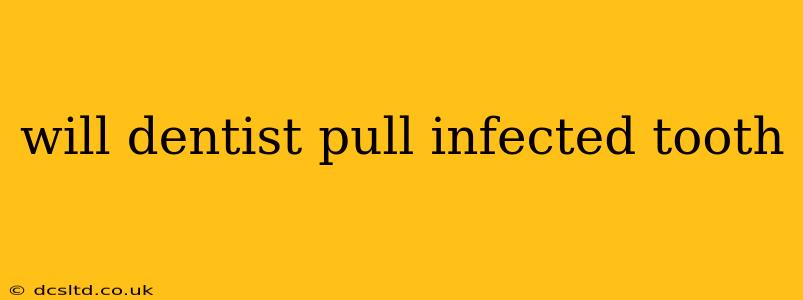Dental infections are serious and require prompt professional attention. A common question many people have is whether a dentist will pull an infected tooth. The short answer is: yes, often a dentist will extract a severely infected tooth. However, it's not always the first course of action, and the decision depends on several factors. Let's delve into the specifics.
What Happens When a Tooth Becomes Infected?
A tooth infection, also known as an abscess, occurs when bacteria invade the tooth's pulp (the soft tissue inside). This can happen due to untreated cavities, gum disease, cracked teeth, or injuries. The infection can cause significant pain, swelling, and potentially spread to other areas of the face and body. Symptoms may include throbbing pain, sensitivity to hot and cold, swelling of the gums, and even fever.
When is Tooth Extraction Necessary?
While antibiotics can sometimes address the infection, extraction becomes necessary when:
- The infection is severe and unresponsive to antibiotics: If the infection is extensive and antibiotics haven't effectively cleared it, extraction may be the only way to eliminate the source of the infection and prevent further complications.
- Extensive damage to the tooth: If the infection has caused significant damage to the tooth structure, making restoration impossible, extraction is often the best option. A severely damaged tooth may be too fragile to support a crown or other restorative procedures.
- The infection has spread: If the infection has spread beyond the tooth to the surrounding bone or tissues (osteomyelitis), prompt extraction is crucial to prevent more serious health consequences.
- The patient's overall health: In cases where a patient has underlying health conditions that compromise their immune system, aggressive treatment, including extraction, may be necessary to prevent the infection from worsening.
What are the Alternatives to Extraction?
Before recommending extraction, dentists will explore all possible alternatives, including:
- Root Canal: This procedure removes the infected pulp and cleans the inside of the tooth, allowing it to heal. This is often the preferred option if the tooth structure is largely intact and the infection is contained.
- Antibiotics: Antibiotics help fight the infection, but they don't address the underlying cause. They are often used in conjunction with other treatments.
- Drainage: In some cases, a dentist might make a small incision to drain the pus from the abscess, relieving pressure and promoting healing.
What Happens During an Extraction?
The extraction process itself will depend on the severity of the infection and the tooth's position. Simple extractions are performed for teeth that are relatively easy to access, while surgical extractions may be necessary for impacted or severely damaged teeth. Local anesthesia is typically used to numb the area, minimizing pain during the procedure.
Will My Dentist Give Me Pain Relief?
Yes, your dentist will provide pain relief before, during, and after the procedure. This may include local anesthesia to numb the area during the extraction, as well as pain medication to manage discomfort afterward. Your dentist will provide detailed post-operative instructions to ensure proper healing.
How Long Does It Take to Recover from an Infected Tooth Extraction?
Recovery time varies but generally ranges from a few days to a couple of weeks. You can expect some swelling, discomfort, and bleeding initially. Your dentist will provide specific aftercare instructions to promote healing and minimize complications. Following their instructions meticulously is crucial for a smooth recovery.
Can I Prevent Tooth Infections?
Preventing tooth infections is key! Excellent oral hygiene practices, regular dental checkups and cleanings, and prompt treatment of cavities are crucial in preventing infections. Maintaining a healthy diet and avoiding excessive sugar intake also play a vital role in oral health.
By understanding the factors that influence a dentist's decision to extract an infected tooth, you can be better prepared to discuss treatment options and make informed choices about your oral health. Remember, early detection and treatment are crucial in minimizing complications and ensuring a successful outcome. Always consult with your dentist for any concerns about oral health.
